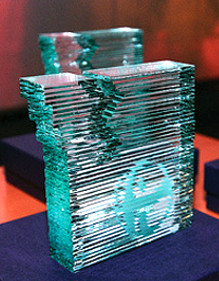
The latter two are previous laureates of Transparency International’s (TI) Integrity Award, which, since 2000, has recognised and applauded the courage of the many remarkable individuals and organisations fighting corruption around the world. The organisation announces its 2014 laureates on Friday morning, 17 October, followed by a ceremony in the evening.
There have been 36 winners in the 14 years since the award’s inception, drawn from civil society, government, and various professions. Many have received their award posthumously, having given their lives for the cause for which they fought so determinedly. Only in 2011 was there just one winner, the Cameroonian Cardinal Tumi.
The award, says TI, consists of a trophy and participation in the high-profile award ceremony, with a broad range of people and institutions from the anti-corruption space in attendance.
“Winners are a source of inspiration to the anti-corruption movement because their actions echo a common message: that corruption can be challenged,” says TI.
People of integrity, making a difference
Nominations for the Integrity Award were open to the public. The jury comprised 11 individuals from across the world, all of whom have long been active in the anti-corruption movement.
Awards can be given to “a particular action or initiative, undertaken by one or several individuals or organisations, which constitutes a tangible contribution to the fight against corruption and the goals of the TI movement”. The TI award committee evaluates nominations while keeping in mind the need to recognise efforts in diverse fields of civil society, the private sector and government around the world – as well as achieving occupational and geographical balance.
To be eligible for a TI Integrity Award, persons or organisations must meet the following criteria:
- He or she or it must have undertaken an action that is likely to significantly influence, or to have had a significant impact on, existing levels of corruption in his/her/its respective country or region.
- The action should be one likely to attract interest and emulation in other parts of the world.
- The action must be particularly courageous, innovative or imaginative and deserving of wide international recognition.
- Nominations for posthumous awards can be considered by the committee only in truly exceptional cases.
While any person or organisation may nominate another, self-nominations are not accepted, and persons or organisations of questionable integrity or goals will also not be considered. The awards committee may make its own nomination, if it is moved to do so.
If possible, nominations should be accompanied by a supporting motivation from the relevant TI chapter – or the appropriate chapter may be invited to provide its own assessment of a nomination.
Once all the nominations have been scrutinised, the committee members will each cast a vote and, based on this, draw up a shortlist – this may or may not be publicised, depending on whether the nominees have agreed to this or not. Then there is a second round of voting which will determine the recommended winner or winners – but it’s up to the TI board of directors to give the final yea or nay.
If there is no suitable nominee, the committee will also recommend that no award be given that year.
Watch this space for details of this year’s winners!
Previous winners:
2013:
Rafael Marques de Morais, Journalist and Human Rights Activist – Angola
Luo Changping: Journalist – China
“Our two winners this year represent everything our international movement stands for as we work to end the abuse of power, secret dealings and bribery,” said Huguette Labelle, TI chairperson. “Everyone challenges corruption in their own way and Marques and Luo are an inspiration for the way they chose to combat this scourge.”
2011
His Eminence Cardinal Christian Tumi: Cardinal – Cameroon
2010
Grégory Ngbwa Mintsa: Citizen – Gabon
Sergei Magnitsky: Tax lawyer – Russia (Posthumous)
Attotage Prema Jayantha: Investigative Journalist – Sri Lanka
2009
Roman Shleynov: Journalist – Russia
David Leigh: Journalist – United Kingdom
2007
Mark Pieth: Professor – Switzerland
Le Hien Duc: School teacher – Vietnam
2006
Dr. Ana Cecilia Magallanes Cortez: Prosecutor – Peru
Khairiansyah Salman: Auditor – Indonesia
The Movement for Quality Government government watchdog – Israel
Abdou Latif Coulibaly: Journalist – Senegal
2004
Constable Naftali Lagat, police officer and David Munyakei, former clerk at Central Bank – Kenya
Dr Milica Bisic: Former Head of the Tax Administration in Republika Srpska – Bosnia and Herzegovina
Hasan Balikçi: Electrical engineer – Turkey (Posthumous)
Satyendra Kumar Dubey: Public servant – India (Posthumous)
Manik Chandra Saha: Journalist and activist – Bangladesh (Posthumous)
2003
Sua Rimoni Ah Chong: Former Controller and Chief Auditor of Samoa – Samoa
Dr. Dora Akunyili:Director General of Nigeria's National Agency for Food and Drug Administration and Control – Nigeria
Ana Hazare: anti-corruption campaigner – India
António Siba-Siba Macuácua: Banker – Mozambique (Posthumous)
Abdelhaï Beliardouh: Journalist – Algeria (Posthumous)
2002
Luis Roberto Mesquita: Businessman – Brazil
Peter Schönhöfer: Pharmacologist – Germany
Jana Dubovcová: District Court Chief Justice – Slovak Republic
2001
Eva Joly: Investigating Magistrate – France
The Public Prosecutor's Office and the People of the City of Londrina – Brazil
Carlos Alberto Cardoso: Journalist – Mozambique (Posthumous)
Dr. Luis Carlos Galán Sarmiento: Politician – Colombia (Posthumous)
Georgy Gongadze: Journalist – Ukraine (Posthumous)
2000
Dr Alfredo María Pochat: Lawyer – Argentina (Posthumous)
Lasantha Wickramatunga: Journalist – Sri Lanka
Concerned Citizens of Abra for Good Government – Philippines
Mustapha Adib: Air Force Captain – Morocco

